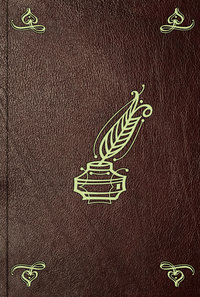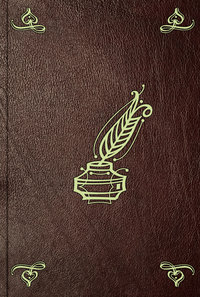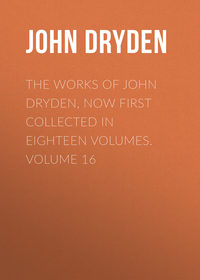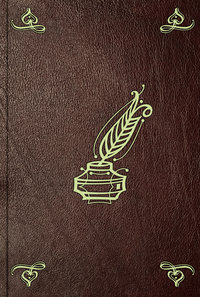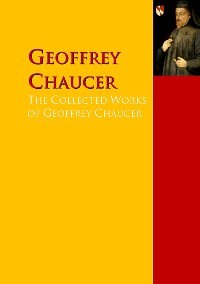 полная версия
полная версияThe Works of John Dryden, now first collected in eighteen volumes. Volume 12
THE LAST PARTING OF HECTOR AND ANDROMACHE. FROM THE SIXTH BOOK OF THE ILIAD
THE ARGUMENTHector returning from the field of battle, to visit Helen, his sister-in-law, and his brother Paris, who had fought unsuccessfully, hand to hand with Menelaus, from thence goes to his own palace to see his wife Andromache, and his infant son Astyanax. The description of that interview is the subject of this translation.
Thus having said, brave Hector went to seeHis virtuous wife, the fair Andromache.He found her not at home; for she was gone,}Attended by her maid and infant son, }To climb the steepy tower of Ilion; }From whence, with heavy heart, she might surveyThe bloody business of the dreadful day.Her mournful eyes she cast around the plain,And sought the lord of her desires in vain.But he, who thought his peopled palace bare,When she, his only comfort, was not there,Stood in the gate, and asked of every one,Which way she took, and whither she was gone;If to the court, or with his mother's train,In long procession to Minerva's fane?The servants answered, – Neither to the court,Where Priam's sons and daughters did resort;Nor to the temple was she gone, to moveWith prayers the blue-eyed progeny of Jove;But more solicitous for him alone,Than all their safety, to the tower was gone,There to survey the labours of the field,Where the Greeks conquer, and the Trojans yield;Swiftly she passed, with fear and fury wild;The nurse went lagging after with the child.This heard, the noble Hector made no stay,The admiring throng divide to give him way;He passed through every street, by which he came,And at the gate he met the mournful dame.His wife beheld him; and, with eager pace,Flew to his arms, to meet a dear embrace.His wife, who brought in dower Cilicia's crown,And in herself a greater dower alone;Aetion's heir, who, on the woody plainOf Hippoplacus, did in Thebé reign.Breathless she flew, with joy and passion wild;The nurse came lagging after with the child.The royal babe upon her breast was laid,Who, like the morning star, his beams displayed.Scamandrius was his name, which Hector gave,From that fair flood which Ilion's wall did lave;But him Astyanax the Trojans call,From his great father who defends the wall.Hector beheld him with a silent smile,His tender wife stood weeping by the while;Pressed in her own, his warlike hand she took,Then sighed, and thus prophetically spoke: —Thy dauntless heart, which I foresee too late,Too daring man, will urge thee to thy fate.Nor dost thou pity, with a parent's mind,This helpless orphan, whom thou leav'st behind;Nor me, the unhappy partner of thy bed,Who must in triumph by the Greeks be led.They seek thy life; and, in unequal fightWith many, will oppress thy single might.Better it were for miserable meTo die, before the fate which I foresee;For, ah! what comfort can the world bequeathTo Hector's widow, after Hector's death!Eternal sorrow and perpetual tearsBegan my youth, and will conclude my years;I have no parents, friends, nor brothers left,By stern Achilles all of life bereft.Then, when the walls of Thebes he overthrew,His fatal hand my royal father slew;He slew Aetion, but despoiled him not,Nor in his hate the funeral rites forgot;Armed as he was he sent him whole below,And reverenced thus the manes of his foe.A tomb he raised; the mountain-nymphs aroundEnclosed, with planted elms, the holy ground.My seven brave brothers, in one fatal day,To death's dark mansions took the mournful way;Slain by the same Achilles, while they keepThe bellowing oxen, and the bleating sheep.My mother, who the royal sceptre swayed,Was captive to the cruel victor made,And hither led; but, hence redeemed with gold,Her native country did again behold,And but beheld; for soon Diana's dart,In an unhappy chace, transfixed her heart.But thou, my Hector, art thyself aloneMy parents, brothers, and my lord, in one.O, kill not all my kindred o'er again, }Nor tempt the dangers of the dusty plain }But in this tower, for our defence, remain.}Thy wife and son are in thy ruin lost;This is a husband's and a father's post.The Scæan gate commands the plains below; }Here marshal all thy soldiers as they go; }And hence, with other hands, repel the foe.}By yon wild fig-tree lies their chief ascent,And thither all their powers are daily bent.The two Ajaces have I often seen,And the wronged husband of the Spartan queen;With him his greater brother; and, with these,Fierce Diomede, and bold Meriones;Uncertain if by augury, or chance,But by this easy rise they all advance;Guard well that pass, secure of all beside. —To whom the noble Hector thus replied:That and the rest are in my daily care;But, should I shun the dangers of the war,With scorn the Trojans would reward my pains,And their proud ladies, with their sweeping trains;The Grecian swords and lances I can bear,But loss of honour is my only fear.Shall Hector, born to war, his birth-right yield,Belie his courage, and forsake the field?Early in rugged arms I took delight,And still have been the foremost in the fight;With dangers dearly have I bought renown,And am the champion of my father's crown.And yet my mind forebodes, with sure presage,That Troy shall perish by the Grecian rage:The fatal day draws on, when I must fall,And universal ruin cover all.Not Troy itself, though built by hands divine,Nor Priam, nor his people, nor his line,My mother, nor my brothers of renown,Whose valour yet defends the unhappy town, —Not these, nor all their fates which I foresee,Are half of that concern I have for thee.I see, I see thee, in that fatal hour,Subjected to the victor's cruel power;Led hence a slave to some insulting sword,Forlorn, and trembling at a foreign lord;A spectacle in Argos, at the loom,Gracing with Trojan fights, a Grecian room;Or from deep wells the living stream to take,And on thy weary shoulders bring it back.While, groaning under this laborious life,They insolently call thee Hector's wife;Upbraid thy bondage with thy husband's name,And from my glory propagate thy shame.This when they say, thy sorrows will increase}With anxious thoughts of former happiness; }That he is dead who could thy wrongs redress.}But I, oppressed with iron sleep before,Shall hear thy unavailing cries no more. —He said;Then, holding forth his arms, he took his boy,The pledge of love and other hope of Troy.The fearful infant turned his head away,And on his nurse's neck reclining lay,His unknown father shunning with affright,And looking back on so uncouth a sight;Daunted to see a face with steel o'erspread,And his high plume that nodded o'er his head.His sire and mother smiled with silent joy,And Hector hastened to relieve his boy;Dismissed his burnished helm, that shone afar,The pride of warriors, and the pomp of war;The illustrious babe, thus reconciled, he took,Hugged in his arms, and kissed, and thus he spoke: —Parent of Gods and men, propitious Jove!And you, bright synod of the powers above!On this my son your gracious gifts bestow;Grant him to live, and great in arms to grow,To reign in Troy, to govern with renown,To shield the people, and assert the crown;That, when hereafter he from war shall come,And bring his Trojans peace and triumph home,Some aged man, who lives this act to see,And who, in former times, remembered me,May say, the son, in fortitude and fame,Outgoes the mark, and drowns his father's name:That, at these words, his mother may rejoice,And add her suffrage to the public voice. —Thus having said;He first, with suppliant hands, the Gods adored;Then to the mother's arms the child restored.With tears and smiles she took her son, and pressedThe illustrious infant to her fragrant breast.He, wiping her fair eyes, indulged her grief,And eased her sorrows with this last relief: —My wife and mistress, drive thy fears away,Nor give so bad an omen to the day;Think not it lies in any Grecian's powerTo take my life, before the fatal hour.When that arrives, nor good nor bad can flyThe irrevocable doom of destiny.Return; and, to divert thy thoughts at home,}There task thy maids, and exercise the loom,}Employed in works that womankind become. }The toils of war, and feats of chivalryBelong to men; and, most of all, to me. —At this, for new replies he did not stay,But laced his crested helm, and strode away.His lovely consort to her house returned,And, looking often back, in silence mourned.Home when she came, her secret woe she vents,And fills the palace with her loud laments;Those loud laments her echoing maids restore,And Hector, yet alive, as dead deplore.1
"If the King's Majesty say but Ho! or give any other signal, then they who are within the lists, with the constable and marshal, throwing their lances between the appellant and defendant, so part them." —The Ancient Method of Duels before the King.
2
Published in 8vo, in 1680. This version was made by several hands. See introductory remarks on Dryden's Translations. Johnson gives the following account of the purpose of Dryden's preface:
"In 1680, the epistles of Ovid being translated by the poets of the time, it was necessary (says Dr Johnson) to introduce them by a preface; and Dryden, who on such occasions was regularly summoned, prefixed a discourse upon translation, which was then struggling for the liberty it now enjoys. Why it should find any difficulty in breaking the shackles of verbal interpretation, which must for ever debar it from elegance, it would be difficult to conjecture, were not the power of prejudice every day observed. The authority of Jonson, Sandys, and Holiday, had fixed the judgement of the nation; and it was not easily believed that a better way could be found than they had taken, though Fanshaw, Denham, Waller, and Cowley, had tried to give examples of a different practice."
3
George Sandys' Translation of Ovid was published in folio, in 1626.
4
Ovid was born in the year of Rome 711, and died in 771 of the same æra.
5
The poet himself plainly intimates as much in an epistle to Fabius Maximus, where he represents himself as accusing Love of being the cause of his exile:
O puer! exilii, decepto causa magistro.The deity replies to this charge, by alluding to the secret cause of his banishment, for which the loosness of his verses furnished only an ostensible reason:
JuroNil nisi concessum nos te didicisse magistro,Artibus et nullum crimen inesse tuis,Utque hoc, sic utinam cetera defendere possis,Scis aliud quod te læserit esse magis.6
Martial, lib. XI. epig. 21.
7
Causa meæ cunctis nimium quoque nota ruinæ,Indicio non est testificanda meo.
8
This curious and obscure subject is minutely investigated by Bayle, who quotes and confutes the various opinions of the learned concerning this point of secret history; and concludes, like Dryden, by leaving it very much where he found it. Were I to hazard a conjecture, I should rather think, with our poet, Ovid had made some imprudent, and perhaps fortuitous discovery relating to Livia.
9
Dryden speaks inaccurately, from a general recollection of the passage; for Ovid says distinctly, that the Fates did not give him time to cultivate the acquaintance of Tibullus, any more than of Virgil. The entire passage runs thus:
Temporis illius colui, fovique poetas:Quotque aderant vates, rebar adesse deos.Sæpe suas volucres legit mihi grandior ævo,Quæque nocet serpens, quæ juvat herba, Macer.Sæpe suos solitus recitare Propertius ignes,Jure sodalitii qui mihi junctus erat.Ponticus Heroo, Battus quoque clarus Iambo,Dulcia convictus membra fuere mei.Et tenuit nostras numerosus Horatius auresDum ferit Ausonia carmina culta lyraVirgilium vidi tantum; nec avara TibulloTempus amicitiæ fata dedere meæ.Trist. Lib. IV. Eleg. 9.10
Sir John Denham gives his opinion on this subject in the preface to "The Destruction of Troy;" which he does not venture to call a translation, but "an Essay on the second book of Virgil's Æneis." – "I conceive it is a vulgar error, in translating poets, to affect being fidus interpres; let that care be with them who deal in matters of fact, or matters of faith; but whosoever aims at it in poetry, as he attempts what is not required, so he shall never perform what he attempts: for it is not his business alone to translate language into language, but poesy into poesy; and poesy is of so subtile a spirit, that in the pouring out of one language into another, it will all evaporate; and if a new spirit be not added in the transfusion, there will remain nothing but a caput mortuum, there being certain graces and happinesses peculiar to every language, which give life and energy to the words; and whosoever offers at verbal translation, shall have the misfortune of that young traveller, who lost his own language abroad, and brought home no other instead of it; for the grace of the Latin will be lost by being turned into English words, and the grace of the English by being turned into the Latin phrase."
11
Cowley is now so undeservedly forgotten, that it is not superfluous to insert his own excellent account of the free mode of translation, prefixed to his translations from Pindar. "If a man should undertake to translate Pindar, word for word, it would be thought that one madman had translated another; as may appear, when he that understands not the original, reads the verbal traduction of him into Latin prose, than which nothing seems more raving. And sure rhyme, without the addition of wit, and the spirit of poetry, (quod nequeo monstrare et sentio tantum,) would but make it ten times more distracted than it is in prose. We must consider, in Pindar, the great difference of time betwixt his age and ours, which changes, as in pictures, at least the colours of poetry; the no less difference betwixt the religions and customs of our countries, and a thousand particularities of places, persons, and manners, which do but confusedly appear to our eyes at so great a distance; and, lastly, (which were enough, alone, for my purpose,) we must consider, that our ears are strangers to the music of his numbers, which sometimes, (especially in songs and odes,) almost without any thing else, makes an excellent poet. For though the grammarians and critics have laboured to reduce his verses into regular feet and measures, (as they have also those of the Greek and Latin comedies,) yet, in effect, they are little better than prose to our ears: and I would gladly know what applause our best pieces of English poesy could expect from a Frenchman or Italian, if converted faithfully, and word for word, into French or Italian prose. And when we have considered all this, we must needs confess, that after all these losses sustained by Pindar, all we can add to him by our wit and invention, (not deserting still his subject,) is not like to make him a richer man than he was in his own country. This is, in some measure, to be applied to all translations; and the not observing of it is the cause, that all which ever I yet saw are so much inferior to their originals. The like happens, too, in pictures, from the same root of exact imitation; which being a vile and unworthy kind of servitude, is incapable of producing any thing good or noble. I have seen originals, both in painting and poesy, much more beautiful than their natural objects; but I never saw a copy better than the original: which indeed cannot be otherwise; for men resolving in no case to shoot beyond the mark, it is a thousand to one if they shoot not short of it. It does not at all trouble me, that the grammarians, perhaps, will not suffer this libertine way of rendering foreign authors to be called translation; for I am not so much enamoured of the name translator, as not to wish rather to be something better, though it wants yet a name. I speak not so much all this in defence of my manner of translating or imitating, (or what other title they please,) the two ensuing odes of Pindar; for that would not deserve half these words, as by this occasion to rectify the opinion of divers men upon this matter."
12
These lines are original.
13
This epistle was partly translated by Lord Mulgrave.
14
Ariadne.
15
A Phrygian nymph, seduced and deserted by Paris before his Spartan expedition.
16
Dryden here misinterprets his author:
Hæc mihi narrȃras, nec me movere—The line would have run more justly thus:
This struck not, while thou told'st, my tender heart.17
See his letter to Tonson, in which he thus expresses himself: "About a fortnight ago, I had an intimation from a friend, by letter, that one of the secretaries, I suppose Trenchard, had informed the queen, that I had abused her government, (these were his words,) in my epistle to Lord Radcliffe; and that thereupon she had commanded her historiographer to fall upon my plays, which he assures me he is now doing. I doubt not his malice, from a former hint you gave me; and if he be employed, I am confident 'tis of his own seeking, who, you know, has spoken slightly of me in his last critique, and that gave me occasion to snarl again."
18
Lord Radcliffe was the eldest son of Francis, Earl of Derwentwater, by Catherine, daughter of Sir William Fenwick. He married Mary Tudor, a natural daughter of Charles II., by Mary Davies, an actress, who had the fortune to attract his majesty's attention, by singing in D'Avenant's "Rivals," the famous mad song,
My lodging is on the cold ground.Lord Radcliffe succeeded to his father in 1696-7, and died 29th April, 1705.
19
These lines are quoted from Lord Dorset's address "to Mr Edward Howard, on his incomparable, incomprehensible poem, called, The British Princes:"
Wit, like tierce claret, when it 'gins to pall,Neglected lies, and's of no use at all;But, in its full perfection of decay,Turns vinegar, and comes again in play.20
The poet apparently speaks of Lady Radcliffe, who probably inherited those vocal powers, with which her mother, Moll Davies, charmed Charles II. The Grace might be her daughter.
21
In all our earlier poets, the word sea is occasionally made to rheme, according to the pronunciation of Hibernia, as if spelled say.
22
Ovid is not answerable for the speed of the stag's exertions in the water; he barely says,
Crura nec ablato prosunt velocia cervo.
23
See the same image in the "Annus Mirabilis:"
"With his loll'd tongue he faintly licks his prey,His warm breath blows her flix up as she lies."Vol. IX. p. 128.24
Amphialus.
25
Called in more modern times a settee. The old word, settle, occurs in the first part of Bunyan's "Pilgrim's Progress;" where Christian, at the bottom of the Hill of Difficulty, finds an arbour with a settle.
26
To whom the olive was sacred.
27
Pasiphae.
28
The parrots are of Dryden's introduction.
29
Adonis.
30
Ceyx was the son of the Morning Star.
31
The swan.
32
The Centaurs, a people of Thessaly, said to be begotten by Ixion, on the cloud which he took for Juno.
33
– Felicem diximus illaConjuge Pirithoum: quod pæne fefellimus omen.The translation is somewhat obscure; it means, "All wished her joy, and it had nearly happened that all had wished it in vain."
34
The dress seems to apply to the clothing of the Centaur's human part, the habit to the furniture of the horse; perhaps, however, habit means his mode of life.
35
Unhoped for unexpected. See note on "death unhoped," in the fable of the Cock and the Fox, Vol. XI.
36
Vulcan, the god of fire.
37
Dolon demanded the horses of Achilles, as his reward for exploring the Grecian camp, but was intercepted and slain by Ulysses.
38
The Hyacinth.
39
Simagres, one of our author's Gallicisms, for affected contortions of the face.
40
The word bear-cubs is wanting, to complete the sense of Ovid:
"Villosæ catulos ursæ."41
Nessus, mortally wounded by Hercules with a poisoned arrow.
42
A latinism, for restores, or presents anew.
43
The Minotaur.
44
Scylla.
45
The famous brazen bull of Phalaris is here, rythmi gratia, converted into a cow. The story of his inclosing Perillus, the inventor, in the engine which he had contrived, is well-known.
46
Grateful is here used for pleasing.
47
Mainburg's "History of the League," translated by our author, at the command of Charles II.
48
First published in 1680.
49
Sir Peter Lely, by birth a Dutchman, came to England in 1641, and died in 1680. There is a remarkable similarity between his female portraits, which seems to have arisen from the circumstance mentioned by Dryden, of his bringing all his subjects as near as possible to his own idea of the beautiful. Pope's lines in his praise are too well known to be quoted.
50
Annibale Caro died at Rome, 1566.
51
He died in the year of Rome 699, before the commencement of the Augustan age.
52
The celebrated Hobbes, who died in 1679.
53
I wish our author had attended to his noble friend Roscommon's recommendation:
Immodest words admit of no defence,For want of decency is want of sense;What moderate fop would range the Park, or stews,Who among troops of faultless nymphs might chuse?54
This error, however, went through the subsequent editions.
55
Thomas Creech, a particular friend of our author. He was born in 1659, and in June 1700 committed suicide; for which rash action no adequate cause has been assigned. Besides the translation of Lucretius, which is his principal work, he executed an indifferent version of Horace, and translated parts of Theocritus, Ovid, Juvenal, Virgil, &c. In his translation of Lucretius, he omitted the indelicate part of the Fourth Book; a deficiency which Dryden thought fit to supply, for which he has above assigned some very inadequate reasons. Creech's Lucretius first appeared at Oxford, in 8vo, 1682, and was reprinted in the year following. The annotations, to which our author alludes a little lower, were originally attached to a Latin edition of Lucretius, superintended by Creech, and afterwards transferred to his English version. They display great learning, and an intimate acquaintance with the Epicurean philosophy.
56
Our author, in the Dedication to "Cleomenes," compliments Lord Rochester on his power of critically understanding the beauties of Horace, and upon his particular affection for this particular Ode. See Vol. VIII. p. 193.
57
Mr Malone has observed, that this quotation, as well as that which follows, is inaccurate; the words of Juvenal are, "nequeo monstrare, et sentio tantum."
58
Dryden's son was amongst the contributors.
59


